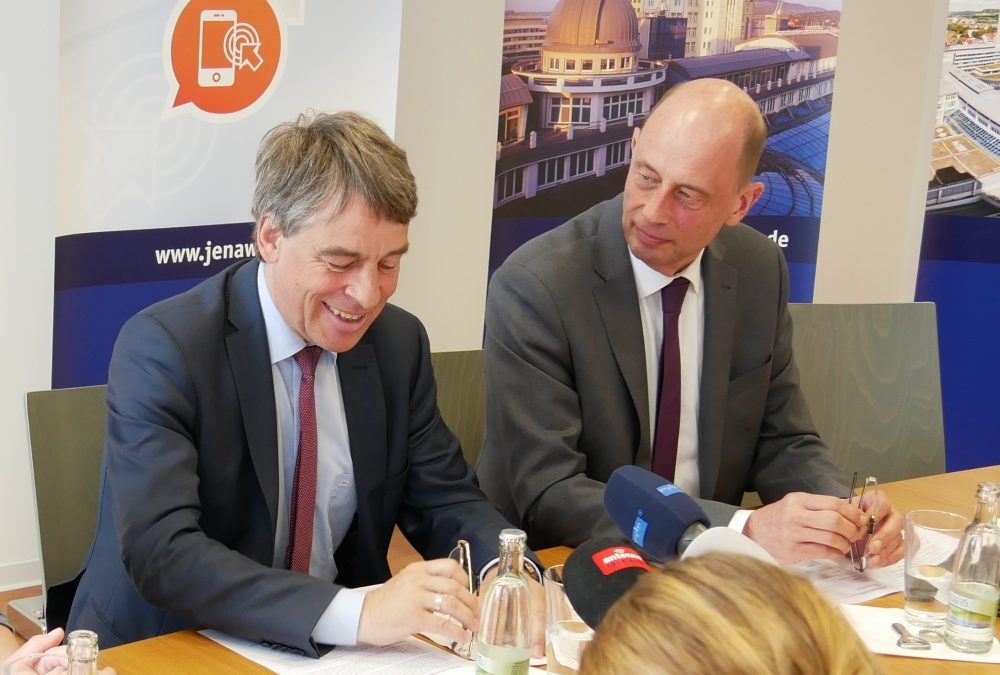In cooperation with the state of Thuringia, the city of Jena has developed an eight-point strategy for the expansion of digitalisation in order to further advance the vision of a “Smart City Jena”. Together with Economics Minister Wolfgang Tiefensee, Lord Mayor Dr. Albrecht Schröter presented the plan for a future digital model region in Jena on 26 April.
The eight-point strategy includes topics from various urban areas that can be made more efficient and transparent through digitalisation. Among other things, traffic control computers and traffic light technology in Jena are to be modernised and a traffic guidance system created to avoid traffic jams and reduce parking search traffic. A digital construction site management system is to inform the administration and citizens about major construction sites in the city. By implementing e-government applications, Jena residents will be able to use more digital administrative and service offerings in the citizen and business service portal in future. Digital and information-based education in schools and extracurricular activities are also on the agenda.
The city of Jena already provides various static and dynamic data in the form of statistics, maps and texts on an open data portal. This includes, for example, data sets on the population structure, the local educational landscape, the locations of Stadtwerke Jena-Pößneck’s charging stations and the development of the city centre since 1991.
“Digitalisation is one of the big issues of the future,” said Lord Mayor Schröter. “The city of Jena is rising to this challenge.” A central aspect of the strategy presented is the creation of the appropriate foundations for a nationwide gigabit network, for example to install public Wi-Fi throughout the city. Both state and federal funding will be used for the necessary broadband expansion in Jena. As part of the federal broadband funding programme of the Federal Ministry of Transport and Digital Infrastructure (BMVI), the city of Jena will receive funding of 2.6 million euros. Thuringia will provide 2.1 million euros in funding as co-financing for the broadband expansion.
Minister Tiefensee emphasised the state’s support for the current digitisation project: “Together, we want to develop Jena into Thuringia’s digital model region. With the city’s eight-point strategy, there is now a clear roadmap for this. This is the prerequisite for benefiting from the state’s funding pots.” The minister also expects additional support from the federal level, where new initiatives and programmes are to be launched, particularly in the field of digitalisation. According to Tiefensee, the Jena concept would be an excellent way to build on this. “The time is right. The state and federal governments are providing fresh impetus for digitalisation. With its smart city offensive, Jena has set sail in good time to take advantage of this wind.”
The Thuringian Ministry of Economic Affairs, Science and Digital Society has promised funding of around 75,000 euros until the end of 2019, for example to develop an action plan and an implementation strategy with specific projects. On the basis of the concept now presented, the city of Jena will also have the opportunity in future to acquire funding in other areas – including business, science, schools, energy, mobility and the expansion of broadband and WLAN.

Photo above: Lord Mayor Dr Albrecht Schröter (left) and Wolfgang Tiefensee (Thuringian Minister for Economic Affairs, Science and Digital Society) present the eight-point strategy for the expansion of digitalisation in Jena on 26.04.2018.
Photo credit: City of Jena/ Kristian Philler
Photo below: The city center of Jena.
Photo credit: City of Jena / Daniel Hering

